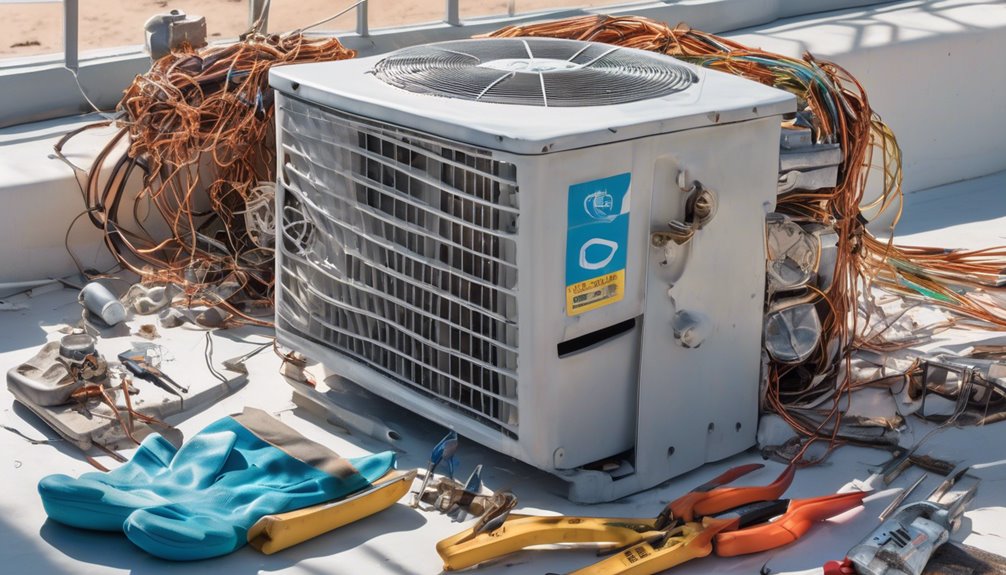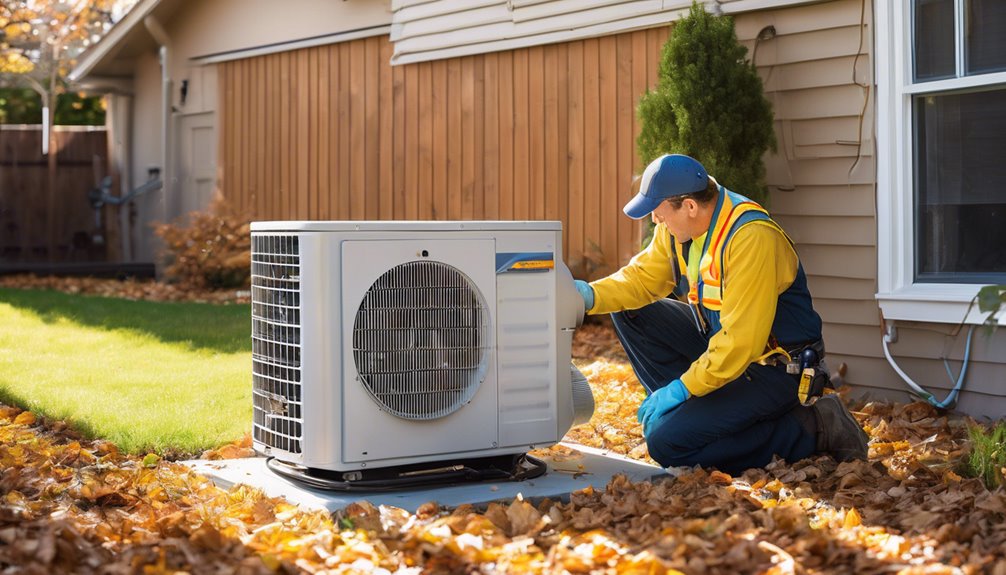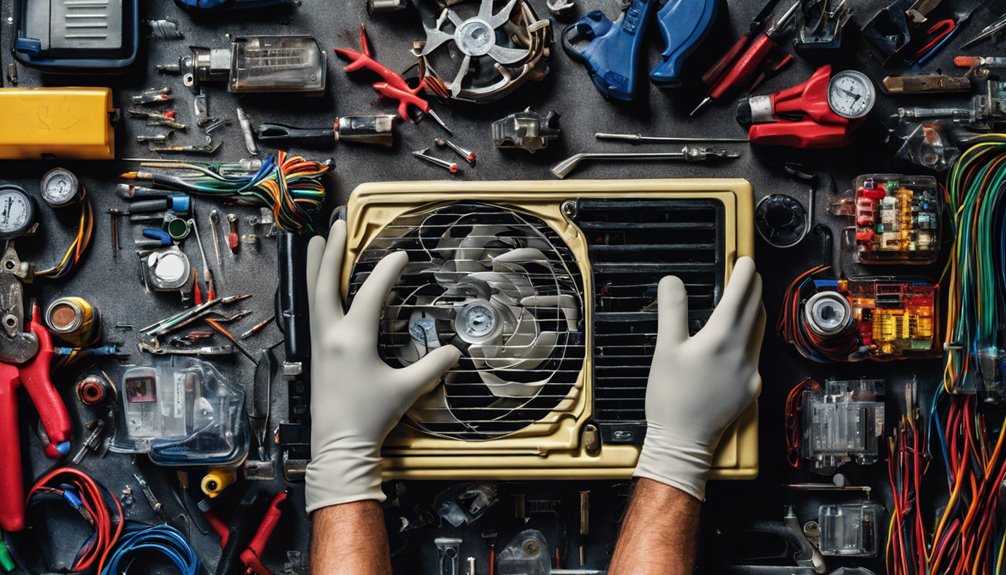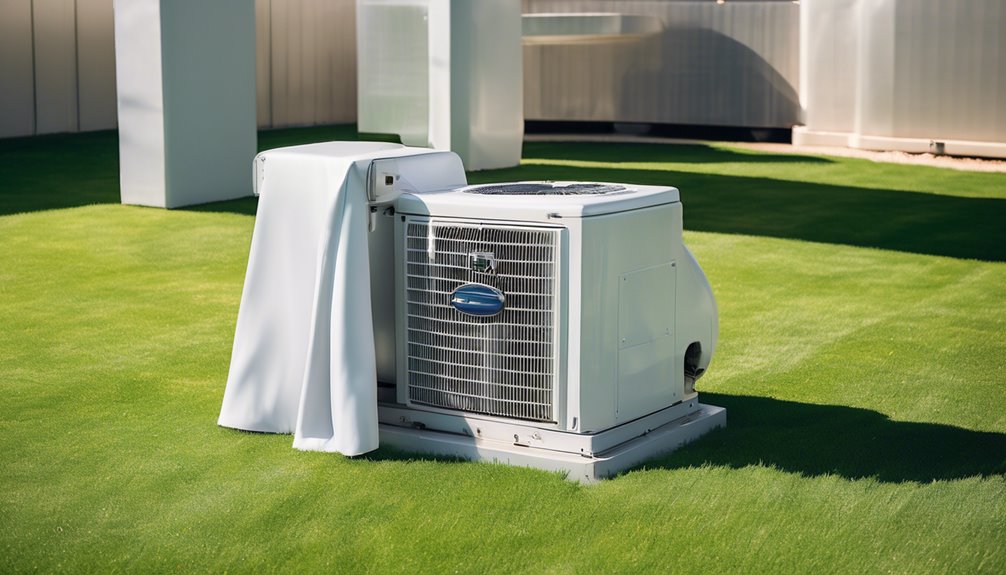When your AC isn't working right, don't sweat it! Start by checking the power source and making sure the circuit breaker or fuse hasn't tripped. Next, inspect the air filter – a dirty one can cause big problems. Look for signs of leaks, water damage, or unusual noises, and investigate thermostat settings and condenser coils. Finally, verify proper airflow through your vents. By ruling out these common issues, you'll be well on your way to diagnosing the problem – and finding a fix might be just around the corner.
Key Takeaways
- Check the circuit breaker, power cord, and outlet for issues, and ensure the AC unit is receiving power before moving on to other diagnosis.
- Inspect and maintain the air filter regularly to prevent airflow reduction, energy bill increases, and overheating.
- Look for signs of refrigerant leaks, water damage, and unusual noises, which can indicate serious AC problems.
- Verify the thermostat settings and inspect the condenser coils for dirt, debris, or corrosion to ensure proper functioning.
- Check the ductwork for leaks, seal gaps, and verify proper airflow by holding your hand near the vents.
Check the Power Source
First, ensure the AC unit is receiving power by checking the circuit breaker or fuse box.
Ensure your AC unit is receiving power by first checking the circuit breaker or fuse box for any tripped switches.
If that's okay, check the power cord for any signs of damage or wear. Make sure it's securely plugged into both the AC unit and the outlet. Power cord issues can be a common problem, so inspect it carefully.
Also, check the outlet itself for any signs of overheating or damage. Outlet problems can prevent the AC unit from getting the power it needs.
If you're still unsure, try plugging the AC unit into a different outlet to rule out any issues with the electrical supply.
Inspect the Air Filter
Your air conditioner's air filter plays a crucial role in its performance, and a dirty or clogged filter can significantly reduce its ability to cool your space efficiently. It's essential to inspect the air filter regularly to ensure your AC is running smoothly.
| Dirty Filter Effects | Filter Maintenance Benefits |
|---|---|
| Reduced airflow | Improved indoor air quality |
| Increased energy bills | Lower energy consumption |
| AC overheating | Extended AC lifespan |
| Unpleasant odors | Fresh, clean air |
Look for Leaks and Water Damage
Air conditioning leaks can lead to water damage, mold growth, and even electrical issues, so it's crucial to identify and address them promptly.
To check for leaks, you'll need to inspect your AC unit and surrounding areas.
- Refrigerant trails: Check the copper lines for signs of refrigerant leaks, which can cause ice buildup or oily residue.
- Moisture accumulation: Inspect the drain pan and surrounding areas for water spots, mineral deposits, or rust.
- Water damage: Look for warping, staining, or discoloration on walls, ceilings, or floors near the AC unit.
Remember to act quickly if you find any of these signs, as they can lead to more severe problems down the line.
Investigate Unusual Noises
Now that you've checked for leaks and water damage, it's time to tune in to your AC's sounds.
Unusual noises can indicate specific problems, so listen carefully. Whirring sounds might mean loose or misaligned belts, which can cause the compressor to work harder and increase your energy bills.
Listen carefully for unusual noises, as whirring sounds can signal loose or misaligned belts and increased energy bills.
Grinding sounds, on the other hand, could signal worn or broken bearings, which can lead to motor failure if left unchecked.
Take note of when the noises occur – during startup, operation, or shutdown – as this can help you narrow down the problem.
Check the Thermostat Settings
The thermostat is the brain of your cooling system, so it's essential to check its settings to diagnose AC problems.
Make sure it's set to "cool" mode, especially during the summer months when you need it most.
Check the following settings:
- Summer settings: Ensure the thermostat is set to the correct mode for the season. If you're still in winter mode, it mightn't be cooling your home efficiently.
- Temperature fluctuations: Verify that the temperature is set correctly and not fluctuating wildly. Large temperature swings can put unnecessary strain on your AC.
- Override settings: Check if any override settings, like a "hold" or "vacation" mode, are activated, which might be preventing your AC from functioning properly.
Examine the Condenser Coils
You've checked the thermostat settings, but if your AC is still not working efficiently, it's time to shift your focus to the outdoor unit.
The condenser coils play a crucial role in heat dissipation, and dirty or damaged coils can significantly reduce your AC's performance. Inspect the coils for signs of dirt, debris, or corrosion.
If you find any, it's essential to clean them using a gentle coil cleaning method to avoid damaging the coil design. Proper coil design is vital for efficient heat transfer, so make sure to clean them carefully.
A clean condenser coil can significantly improve your AC's performance, so don't neglect this crucial step in your troubleshooting process.
Verify Proper Airflow
You'll want to ensure your AC unit is getting the airflow it needs to function efficiently.
To do this, you'll need to check the filter condition, inspect the ductwork for any leaks, and verify that the fan is operating correctly.
Check Filter Condition
Clogged air filters can silently sabotage your AC's performance, leading to increased energy bills, reduced airflow, and even system breakdowns.
To prevent this, you need to check your filter condition regularly.
Dirty air circulating through your AC can cause damage to the system and reduce its efficiency.
Here's what you should do:
- Check the filter every 1-3 months, depending on usage and manufacturer's instructions.
- Inspect the filter for signs of dirt, dust, and debris. If it's dirty, replace it with a new one.
- Make filter maintenance a habit to ensure your AC runs smoothly and efficiently.
Inspect Ductwork Leaks
Leaky ducts can be a significant obstacle to efficient airflow, causing your AC to work harder and increasing your energy bills.
When inspecting your ductwork, look for signs of airloss detection, such as hissing sounds, uneven airflow, or excessive dust accumulation.
You can perform a ductwork inspection by turning off your AC and searching for leaks using a lit incense stick or candle flame near joints and connections. If the smoke or flame flickers, you've likely found a leak.
Check for loose or damaged ducts, and seal any gaps with mastic sealant or foil tape. Repairing leaks will improve airflow, reduce energy consumption, and extend the life of your AC system.
Verify Fan Operation
Now that you've ensured your ductwork is leak-free, it's time to verify your AC's fan operation is up to par.
Proper fan operation is crucial for efficient cooling and air circulation.
To verify fan operation, check the following:
- Fan speed: Ensure the fan is spinning at the correct speed. If it's slow or not spinning at all, it may indicate a problem with the fan motor or capacitor.
- Motor noise: Listen for unusual noises, such as grinding, clunking, or screeching sounds, which can indicate worn or damaged fan blades or motor bearings.
- Airflow: Check for proper airflow by holding your hand near the vents. If the airflow is weak or absent, it may indicate a blockage or restriction in the ductwork or fan.
Check the Circuit Breaker or Fuse
When your AC isn't working, it's easy to assume the worst, but sometimes the solution is surprisingly simple. Before you start digging deeper, check the circuit breaker or fuse box to ensure the AC's circuit hasn't been tripped or blown.
| Symptom | Solution |
|---|---|
| Tripped breaker | Reset the breaker to the "on" position |
| Blown fuse | Replace the fuse with a new one of the same amperage |
| Breaker or fuse box issues | Consult an electrician to inspect and repair |
| AC not turning on | Check the breaker or fuse box before moving on to other diagnosis |
| Unusual smells or sparks | Shut off the AC and consult an electrician immediately |
Frequently Asked Questions
Can I Fix AC Problems Myself or Do I Need a Professional?
You can try fixing AC issues yourself, but DIY risks like electrical shocks or further damage may outweigh savings; if you're unsure, it's often better to pay a pro's repair costs to ensure a safe and effective fix.
How Do I Know if My AC Is Low on Refrigerant?
You'll know your AC is low on refrigerant if you notice a decrease in cooling performance, increased energy bills, or ice buildup on leaky coils. Check refrigerant levels regularly to avoid these issues and ensure your AC runs efficiently.
What Causes My AC to Turn on and off Repeatedly?
You're wondering why your AC turns on and off repeatedly? It might be due to a faulty thermostat that's causing short cycling, making your AC work harder and wasting energy, or it could be a sign of other issues that need attention.
Why Does My AC Blow Warm Air Sometimes?
You're wondering why your AC blows warm air sometimes? It might be due to air flow issues, like clogged filters or blocked vents, or a thermostat malfunction, where it's not accurately reading the temperature, causing the AC to malfunction.
Can I Use a Portable AC to Cool My Entire House?
You're wondering if a portable AC can cool your entire house, but it's unlikely due to space constraints and room layout limitations, making it difficult to distribute cool air effectively throughout your home.
Conclusion
You've made it to the end of your AC troubleshooting journey! If you've checked the power source, inspected the air filter, looked for leaks and water damage, investigated unusual noises, checked the thermostat settings, examined the condenser coils, verified proper airflow, and checked the circuit breaker or fuse, you should have a good idea of what's causing your AC problems. Now, it's time to take action and fix the issue or call a professional to get your AC up and running smoothly again.



